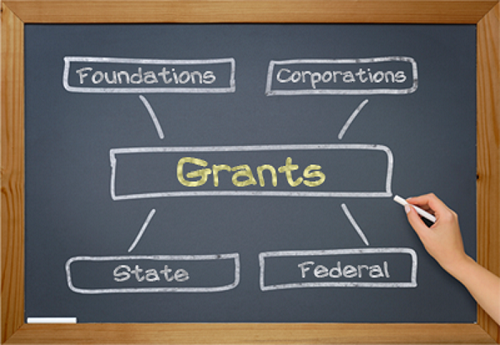Volunteering –What about the Money? Part 4: Grant Writing


As you know from the first series of posts on money—Complexity, Events and Sales, and Philanthropy, fundraising is difficult.. It is a hard task on a good day. Today we will talk about grant (and contracts) writing, a task that needs to be assigned to the most detailed of people in your organization. As always, you can find a more in-depth and action-based discussion on this topic in our free eBook, Volunteering.
The Resources – Foundations and governments award billions of dollars in grants and contracts each year. These cover a wide spectrum of causes, from housing and urban development, security, and feeding the poor around the world to a variety of research endeavors and educational efforts. There may be a granting agency or foundation that pays for the bulk of your organization’s activities. Thus, the first thing you should do as a new volunteer is to read your annual report. This will help you better learn where your sources of funds are derived from to better serve the people and activities with which your organization aligns. Volunteer managers, you, too, need to read the annual reports and any other summary reports that may have been written for your particular sponsors. You all need to know better who your sponsors are and how their funds are spent. Follow the money and you will follow the dependencies, relationships, and your products.
Grants – Grants often seem a mystery to many people, while to others they are simply a set of rules and guidelines that need to be addressed to request funds. Most applicants fail at obtaining grants because the competition is so stiff and because of their poor attention to detail. There are always more requests than there is money available and today there are also many more “good” requests than money available. Many managers with fantastic ideas also do not take the time to develop the relationships necessary with agency and foundation project officers to get a successful grant off the ground.
[bookboon-book id=”838045c1-4dee-4462-9c85-a3390101b8f6″ title=”This article was written by the author of this eBook”]
The number one cause of grant failure is that grant writers do not read and respond well to the solicitations or RFPs (request for proposals) because they do not pay attention to what the sponsor wants to buy, they do not think many of the questions are important, and they are often too self-absorbed in their own purpose or cause to write well and to develop the necessary relationships with the project officers (those who hold the money—more on this below). In short, so many organizations do not take the time to write proposals well. Proposals take enormous time. It is very hard to write a good proposal, and even harder to write a short, good proposal.
I once led an organization in which the smartest people in the room were rarely successful at obtaining grants. They often did great cutting-edge work, bringing us into the 21st century, but didn’t bother enough with what others thought and wanted to buy. However, there were others in the group who were much more grounded than our “thinkers” who were very successful at winning grant money for us and them. They read the rules in the RFP and answered the questions. They did their homework and it showed in the proposals submitted. They, through the written word, showed the grantors that our group could deliver a quality product on time and on budget. We won many more grants than most and at times, well above our pay grades and skill sets, but we learned quickly.
Project Officers – So who are the project officers? These are the people who look after the contracts and the grants that have been given to you. While we may believe the big foundation or big government gave us the funds, that is generally not the case. A few reviewers and a project officer most likely awarded the funds to us within the confines of the agency’s rules. And, these project officers are then the individuals that can make or break a successful work effort. In addition, project officers are often overworked (too many projects to look after) and underpaid, or often paid less than the people actually receiving the funds, leaving them a bit unsettled.
Project officers can be the key to your success. These are often very busy people. They often have more projects to look after than they have the time to do so. So do the right thing. Be the no-headache grantee. Take some extra time to cultivate a relationship with your project(s) officer. On the day a visit is planned, work extra hard to see that all is in order. It is possible you will hear gossip about Project Officer So–and-So being a grind, but pay no mind. These are the folks who manage your money and who manage your ability to obtain more funds at some date into the future. Thus, these relationships are critical, so be on your volunteering best day. Paying the bills is hard. Achieving financial sustainability is very hard. Know that in reality people give money to other people, they do not give money to entities.
Summary – Finally, one last task that is often the easiest, but that so many fall down on: be the gold star student (grantee). Be the awardee that communicates well, turns in reports on time, and is a no-hassle partner. It takes time and effort to see that the sponsor is well taken care of, but too often we pay too much attention to our little world, our volunteer work, when we should be paying more attention to the relationships with our sponsors.
Well, this concludes our series on money. How about printing these four blogs out and have a little meeting to chat “about the money”, because “you haven’t talked about anything unless you’ve talked about the money.” In the end, it’s all about the people, people. Relationships are key; face-time is key; detail is key to securing your financial future. Good luck—it is all doable—so do it all well.
About the author: Karl’s volunteer experience spans three decades. He recently retired as a chief strategy officer, after having implemented the strategic plan of a 1500+ employee service sector organization. He is now a principal with SunshineValley Communications, www.sunshinevalley.org. He holds degrees in engineering and economics and is near completion of a second book on the management of highly competitive environments. He has provided strategic planning, project management and technical assistance to many volunteer organizations and communities. He lives in the US Missouri Ozarks and can be reached at burgher@SunshineValley.org.
[bookboon-recommendations id=”838045c1-4dee-4462-9c85-a3390101b8f6″ title=”You might also find these books interesting…”]




